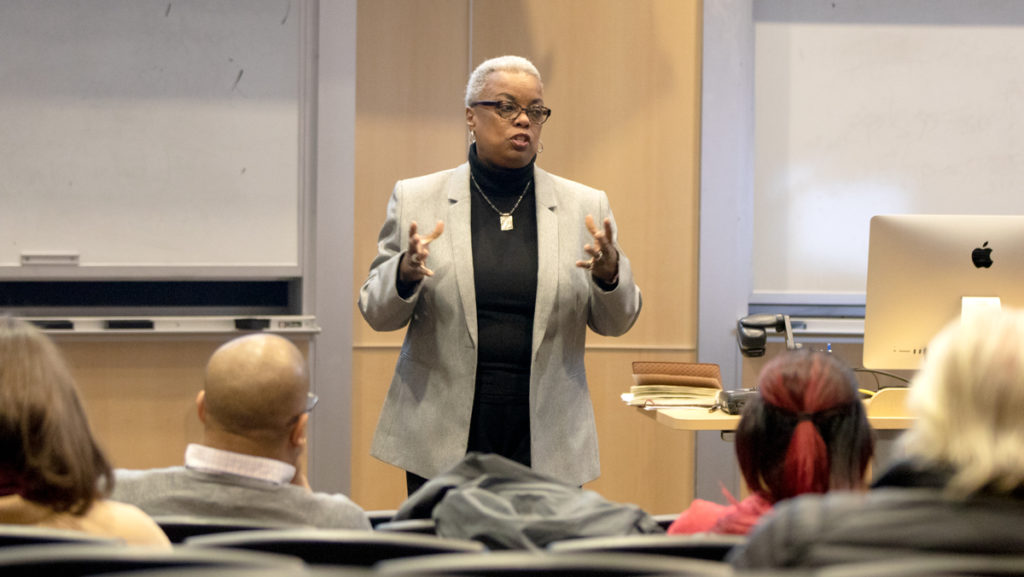The steering committee of the five-year strategic plan for Ithaca College has been working this semester to develop themes and a new vision statement for the project. To develop these concepts, the committee has recently held two open forums to get community feedback and input.
The steering committee has been meeting weekly since the start of the semester and has hosted several events to get the community involved in the process of formulating a new strategic plan. Based on the timeline, the steering committee should have developed themes by the end of November 2018 and form theme–based working groups by Dec. 14. Paula Ioanide, associate professor in the Center for the Study of Culture, Race and Ethnicity and a faculty representative on the steering committee, said the committee has not yet finalized the themes or the working groups for the strategic plan.
Ioanide said the focus of the next couple of meetings of the steering committee is to come up with the themes. Ioanide said this will be done by January at the latest and the working groups will not be filled until the start of the spring semester.
The timeline states that next semester, the steering committee will start meeting biweekly and update the Ithaca College Board of Trustees on the progress of the new strategic plan in the annual February and May meetings.
During this semester, the steering committee got community feedback on the strategic planning process during the all-faculty meeting Oct. 25 and the all-staff meeting Nov. 1, along with the weekly steering committee meetings. The timeline states that the steering committee will have the draft components of the strategic plan completed by the start of May and have a full draft of the strategic plan completed by the end of May. In summer 2019, the steering committee will finalize the draft and have a final strategic plan presented to the community on Sept. 1, 2019, and presented to the board of trustees on Oct. 19, 2019.
The most recent event, held Dec. 6 in Textor 102, was specifically focused on receiving feedback from the campus community on the drafted vision statement that the steering committee has come up with for the college: “Boldly inspiring connection for a thrivable world.”
La Jerne Cornish, provost and senior vice president for academic affairs and co-chair of the steering committee, was leading the session along with fellow co-chair Jason Freitag, presidential fellow and professor in the Department of History. Cornish and Freitag wanted to know what the over 80 staff and faculty who attended the event thought about the drafted vision statement.
The current vision statement for the college is, according to the college website, “Ithaca College strives to become the standard of excellence for student-centered comprehensive colleges, fostering intellect, creativity, and character in an active and inclusive residential learning community.”
Several of the questions asked by those in attendance focused on various words in the drafted statement, such as “boldly,” “connection” and “thrivable.”
Bruce Henderson, professor in the Department of Communication Studies, said he does not think the statement sends the right message.
“I would encourage the committee to think of a different gerund than ‘inspiring,’” Henderson said. “I hope we inspire, but I think the truth is there’s more than inspiring going on; there’s actual making, so maybe making connections for a thrivable world. That’s what a comprehensive college does that’s different from a purely liberal arts college.”
Robert Sullivan, associate professor and culture and communication major coordinator in the Department of Communication Studies, said the use of the word “thrivable” is too nebulous to be useful in a vision statement.
“Making up words that are going to represent everyone’s ideas is just a great way to turn yourself into a target,” Sullivan said. “We’ll spend the rest of our lives explaining to people what [thrivable] is. There’s a lot of things that don’t have words to cover it, and I don’t think our vision statement is the place where we want to get too deep into terminology.”
After the event, the steering committee had everyone fill out index cards with tips and feedback on where the steering committee should go next in terms of the vision statement and beyond.
Kyle Hornyak, assistant director of the Department of College Relations and Communications, said he was glad they held a session like this so the community could provide proper feedback.
“It was good to feel informed,” Hornyak said. “I think it’s good to be transparent about the process and keep the college community informed about the developments in the strategic plan.”
The other event, “K-12 Students of Today, Implications for Us Tomorrow,” was hosted Dec. 4, with approximately 60 staff and faculty members in attendance, by Luvelle Brown, superintendent of the Ithaca City School District and a trustee representative on the steering committee for the strategic plan. President Shirley M. Collado introduced Brown, describing how he has been informing the steering committee on K-12 students and how the college can structure the strategic plan to cater toward students versed in a different style of education.
Brown said students do not learn by sitting behind a desk and expect more from their education.
“They think differently,” Brown said. “My son has never sat at a traditional desk in a chair. He’d rather learn through YouTube than having somebody stand in front of him and speak. He’s looking for services when he walks into a learning space, not amenities, which is different, too. The way he learns is so different from how his daddy learned to teach.”
Brown outlined three key points for educators to remember when teaching students during his presentation: engage, educate and empower. Brown said engagement is important in helping students to properly learn topics rather than being forced into repetition.







